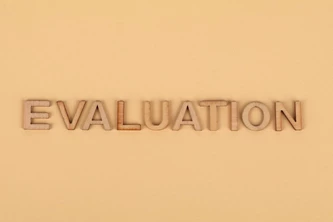 Next up in our ASWB exam content outline tour: Methods to evaluate agency programs (e.g., needs assessment, formative/summative assessment, cost effectiveness, cost-benefit analysis, outcomes assessment).
Next up in our ASWB exam content outline tour: Methods to evaluate agency programs (e.g., needs assessment, formative/summative assessment, cost effectiveness, cost-benefit analysis, outcomes assessment).
Evaluating social work programs is essential to ensure they meet their objectives, are cost-effective, and provide value to clients and stakeholders. (It was nice of the outline writers to include all those e.g.'s, so we know exactly what they're getting at.)
Let's get the terms down and then see how they might appear on the licensing exam.
The Methods
Needs Assessment
A systematic process for identifying and prioritizing the needs of the target population or community that the program aims to serve.
-
- Purpose: To understand the specific needs that a social work program should address.
- Methods: Surveys, interviews, focus groups, and analysis of existing data.
- Outcome: Identifies service gaps and helps prioritize needs for program planning.
Implementation:
-
- Define the Scope: Determine the specific population or issue to be assessed.
- Collect Data: Use surveys, focus groups, interviews, and existing data sources to gather information.
- Analyze Data: Identify common themes, gaps, and priority needs.
- Report Findings: Share results with stakeholders to inform program planning and resource allocation.
Formative Assessment
An ongoing evaluation conducted during the implementation of a program to improve its design and performance.
-
- Purpose: To monitor and enhance a program while it is being implemented.
- Methods: Ongoing feedback, observations, and regular check-ins with stakeholders.
- Outcome: Identifies areas for improvement and adjustment to keep the program on track.
Implementation:
-
- Set Clear Goals: Define what the program aims to achieve.
- Gather Feedback: Collect ongoing feedback from participants, staff, and other stakeholders.
- Analyze Feedback: Identify areas for improvement and make necessary adjustments.
- Document Changes: Record any changes made to the program based on formative assessments.
Summative Assessment
An evaluation conducted after a program has been completed to assess its overall impact and effectiveness.
-
- Purpose: To evaluate the overall effectiveness of a program post-implementation.
- Methods: Surveys, interviews, outcome measurements, and comparison to baseline data.
- Outcome: Provides information on the program's impact, effectiveness, and overall success.
Implementation:
-
- Define Evaluation Criteria: Determine what success looks like for the program.
- Collect Data: Use surveys, interviews, and other tools to gather data post-implementation.
- Analyze Data: Compare results to the baseline and objectives.
- Report Findings: Provide a comprehensive evaluation report detailing the program's effectiveness.
Cost-Effectiveness Analysis (CEA)
Compares the relative costs and outcomes (effects) of different programs or interventions.
-
- Purpose: To determine which program provides the best outcomes for the least cost.
- Methods: Calculating the cost per unit of outcome (e.g., cost per client served, cost per successful intervention).
- Outcome: Helps in resource allocation by identifying the most cost-effective programs.
Implementation:
-
- Identify Alternatives: Determine the programs or interventions to be compared.
- Measure Costs: Calculate all relevant costs for each program.
- Measure Outcomes: Quantify the outcomes for each program.
- Compare Results: Calculate the cost per outcome for each program and compare.
Cost-Benefit Analysis (CBA)
Compares the total expected costs of a program against its total expected benefits, expressed in monetary terms.
-
- Purpose: To assess the financial return on investment of a program.
- Methods: Identifying and quantifying all costs and benefits, and calculating the net benefit (benefits minus costs).
- Outcome: Provides a clear picture of the program's financial viability, aiding decision-making.
Implementation:
-
- Identify Costs and Benefits: List all costs and benefits associated with the program.
- Monetize Benefits: Assign a monetary value to each benefit.
- Calculate Net Benefit: Subtract total costs from total benefits.
- Analyze Results: Determine the program's financial viability and report the findings.
Outcomes Assessment
The process of measuring the specific outcomes or results of a program.
-
- Purpose: To determine whether the program has achieved its goals and objectives.
- Methods: Setting measurable objectives, collecting data on those objectives, and analyzing the data.
- Outcome: Demonstrates the program's effectiveness in achieving its goals and provides accountability.
Implementation:
-
- Set Objectives: Define clear, measurable objectives for the program.
- Collect Data: Gather data related to the objectives throughout the program.
- Analyze Data: Assess whether the objectives have been met.
- Report Results: Share outcomes with stakeholders and use the information to improve the program.
By employing these methods, social work agencies can comprehensively evaluate their programs, make informed decisions about future directions, and demonstrate accountability and effectiveness to stakeholders.
On the Exam
Agency evaluation questions on the social work exam might look like this:
-
A social work agency wants to compare two different programs aimed at reducing juvenile delinquency to see which provides better outcomes for the least cost. Which evaluation method should be used?
-
What is the main purpose of outcomes assessment in a social work program?
-
Which of the following describes a primary outcome of a cost-benefit analysis?
-
A social work program is in its early stages of implementation. The agency wants to ensure the program is on track to meet its goals. Which type of evaluation should be conducted?
Get questions like these--with answers, explanations, and suggested study links!--when you get SWTP's full-length exams.

 Next up in our ASWB exam content outline tour: Methods to evaluate agency programs (e.g., needs assessment, formative/summative assessment, cost effectiveness, cost-benefit analysis, outcomes assessment).
Next up in our ASWB exam content outline tour: Methods to evaluate agency programs (e.g., needs assessment, formative/summative assessment, cost effectiveness, cost-benefit analysis, outcomes assessment).